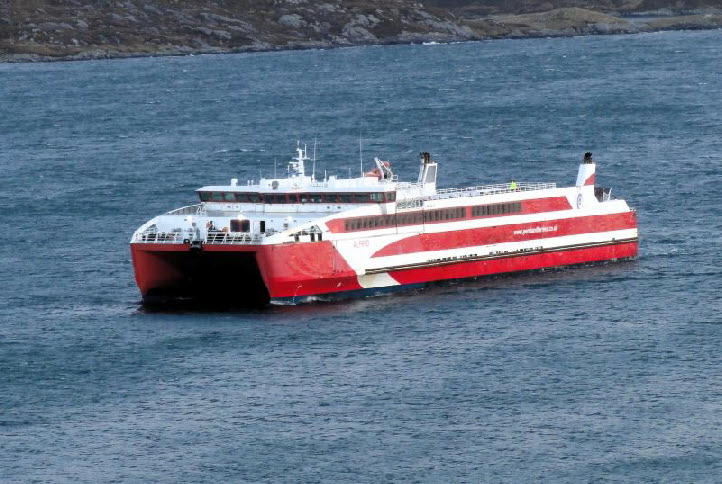The catamaran ferry MV Alfred hit rocks after her captain dozed off while in charge of navigating the vessel near land in July 2022, according to an official investigation.
People on board the Pentland Ferries-owned ship were thrown to the deck with the
impact of the collision resulting in injuries to some 41 crew and passengers.
The incident occurred in good weather off Orkney the year before CalMac hired the Alfred for west coast duties.
Pentland Ferries deploys its own crews during the CalMac charter and is responsible for the vessel.
Investigators from the Marine Accident Investigation Branch say the Alfred grounded because her captain experienced a loss of awareness while helming the vessel close inshore in the Pentland Firth, almost certainly as a result of falling asleep for approximately 70 seconds.
During this period, the Alfred swung towards the coast unchecked at Swona Island south of Orkney says their report.
When the captain became aware of the vessel’s predicament he was unable to prevent the ferry striking the rocks at a speed of 13 knots.
The vessel which had a crew of 13 seafarers was carrying 84 passengers and 37 vehicles.
In addition to injuries to about half the passengers and crew, almost all the vehicles being transported on board were damaged.
The ship’s port bulbous bow was also damaged.
The vessel subsequently refloated on the rising tide and continued to St Margaret’s Hope under its own power later that afternoon; there was no pollution, but the vessel was withdrawn from service for repairs.
Key safety issues identified were the vessel routinely passing too close to land, fatigue led to loss of awareness at a critical point in the vessel’s passage, and lack of assurance that procedures were being followed.
The MAIB report recommends coastal ferries like the MV Alfred should carry voyage data recorders
Andrew Moll, Chief Inspector of Marine Accidents, said: “Lots of safety action has been taken as a result of this accident and I am encouraged by the actions taken by Pentland Ferries to address the issues raised in this report.
“However, this accident offers a wider opportunity for lessons to be learned across the maritime industry.”
He highlighted: “Alfred’s master routinely operated very close to the coast leaving little margin for error when they found themselves in an unsafe situation.
“Regardless of the type of vessel you are operating, it is critical that a safe passage plan is made and that it is followed. Always allow sufficient sea room to enable action to be taken in good time if things are not going to plan.”
He added: “On the afternoon of 5 July 2022, the master almost certainly fell asleep and allowed the ferry to swing towards land. Crew should always be sufficiently well rested when coming on duty.
“Finally, this case highlights the importance of management assuring themselves that plans and procedures they have put in place are actually being followed.
“If you have management oversight of a vessel or maritime operation, ask yourself;
do I know that our crews and front-line staff are following our procedures, and are
our plans fit for purpose in a real-life emergency situation?”
Recommendations have been made to the Maritime and Coastguard Agency (MCA) to ensure that passage plans are available during inspections/surveys.
Guidance should also be issued to the UK domestic ferries on the need to secure heavy object said the MAIB.
The MCA is recommended to review the general exemption issued to UK domestic passenger vessels that removes the requirement for them to carry voyage data recorders.
A recommendation has also been made to Pentland Ferries to ensure that it captures
passenger details and injuries post-accident.
The investigation also identified that Alfred’s passage plan was inadequate and that
its electronic chart system - the ferry’s primary means of navigation - was not being
used effectively to support safe navigation and warn of danger.
Despite the passage plan being in place since the vessel entered service in 2019, neither the Pentland Ferries’ annual audits nor the Maritime and Coastguard Agency’s surveys had detected this safety issue.
Alfred grounded in waters controlled by Orkney Islands Council Harbour Authority but the harbour’s vessel traffic service was not monitoring the movement of the ferry and did not raise the alarm when it entered the guard zone around Swona Island.
Another safety concern relates to Alfred’s emergency response - once aground emergency
procedures did not follow the safety video shown to passengers before departure from
port. The investigation established that this was because the vessel’s procedures
and weekly drills had not adequately prepared the crew for the emergency.
The investigation also found that the Pentland Ferries emergency response team ashore did not prompt the master to create a nominal list of those on board.
MV Alfred ferry grounded after captain ‘fell asleep’ says investigation report
22 May 2024
